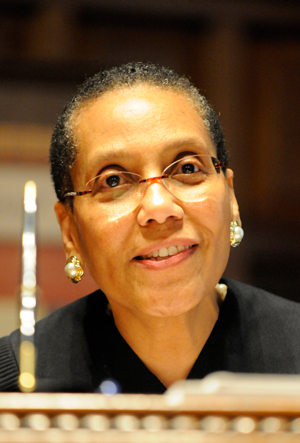Concern surrounds mysterious death of Judge Sheila Abdus-Salaam
By Michael Z. Muhammad -Contributing Writer- | Last updated: Apr 28, 2017 - 12:36:49 PMWhat's your opinion on this article?

Court of Appeals judge Sheila Abdus-Salaam during her swearing in ceremony at the New York Court of Appeals in Albany, N.Y., June 20, 2013. Photo: AP/Wide World photos
|
Mix in the current tenor and tone of race relations and politics in a time of anti-Blackness and White supremacy, and you have a recipe for suspicion. Her death sent shock waves through the New York community.
Initially, the police determined her death was a suicide. A preliminary autopsy report conducted by the medical examiner’s office was returned inconclusive. Police have subsequently backtracked and now say her death is suspicious.
According to published reports, the medical examiner’s office stated that “the cause and manner of death were pending further studies.” Police detectives were looking for surveillance video along her possible path to see whether or not it supported the theory that she walked into the river.
Published reports Judge Abdus-Salaam was grieving and depressed over the death of her 92-year-old mother and brother who the reports said committed suicide were rejected by her family. Her husband, the Rev. Gregory Jacobs, pushed back strongly against reports that his wife committed suicide.
“These reports have frequently included unsubstantiated comments concerning my wife’s possible mental and emotional state of mind at the time of her death,” Reverend Jacobs, who is a minister at the Episcopal Diocese of Newark, wrote in a statement. “Those of us who loved Sheila and knew her well do not believe that these unfounded conclusions have any basis in reality.”
“Sheila’s mother, the matriarch of our family who died at age 92 in 2012, did not take her life,” a family statement read. “Sheila’s younger brother, who died in 2014, lost his battle with terminal lung cancer,” family members added.
Judge Sheila Abdus-Salaam was an associate judge on the New York Court of Appeals. She was also widely hailed as the nation’s first female Muslim judge and as a trailblazer.
Shaun King, writing in the Daily News, said, “the death of Judge Abdus-Salaam brings several painful elephants in the room to the surface that we must address. They may not ultimately apply to her in this case, but the fact that they are on many of our minds, and serve as a subtle subtext for why this case has the notoriety it does, should be explored. Reports of hate crimes have skyrocketed last year and early this year in New York City. Lastly, the fact that Judge Abdus-Salaam fought against issues like corruption and police brutality throughout her career matters. Bold judges, particularly a bold Black woman, could always be a target.”
Student Minister Abdul Hafeez of the Nation of Islam’s Muhammad Mosque No. 7 in Harlem agreed with the assessment. “We felt from the very beginning that her life was taken other than suicide. She is a sitting judge who oversaw trials of corrupt police officers. She was an active judge. Now it has been discovered through the autopsy that there is a discrepancy with the water found in her lungs. So it would seem to suggest she was killed somewhere else and brought to the river,” he said.
The 65-year-old Judge Abdus-Salam was a 1974 graduate of Barnard College and a 1977 graduate of Columbia Law School. On April 5, 2013, she was nominated by New York Governor Andrew Cuomo to fill a vacancy on the New York Court of Appeals. She served as a Manhattan Supreme Court judge for 14 years before Governor Cuomo’s promotion. The governor praised her for having an “unshakable moral compass.”
Family members announced a public memorial service for the well-respected judge set for May 26 at the Cathedral of St. John the Divine in Manhattan’s Morningside Heights neighborhood.
INSIDE STORIES AND REVIEWS
-
-
About Harriett ... and the Negro Hollywood Road Show
By Rabiah Muhammad, Guest Columnist » Full Story -
Skepticism greets Jay-Z, NFL talk of inspiring change
By Bryan 18X Crawford and Richard B. Muhammad The Final Call Newspaper @TheFinalCall » Full Story -
The painful problem of Black girls and suicide
By Charlene Muhammad -National Correspondent- » Full Story -
Exploitation of Innocence - Report: Perceptions, policies hurting Black girls
By Charlene Muhammad -National Correspondent- » Full Story -
Big Ballin: Big ideas fuel a father’s Big Baller Brand and brash business sense
By Bryan Crawford -Contributing Writer- » Full Story






 Click Here Stay Connected!
Click Here Stay Connected!








